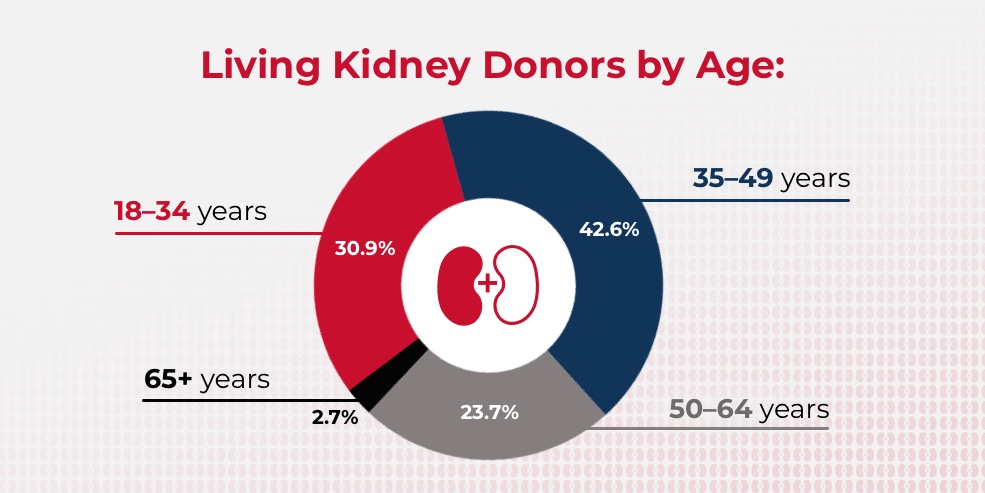What Disqualifies You from Being a Kidney Donor?
Not everyone can donate a kidney. If you are considering becoming a living donor, you might be wondering what would disqualify you from donating a kidney.
Requirements for kidney donation vary by transplant center, but in general, donors must be in good health, with normal kidney function and no major physical or mental illnesses.
Following are some reasons you may be disqualified from donating a kidney. However, it’s important not to disqualify yourself. The best way to find out if you are eligible is to register with the National Kidney Registry and let the transplant center determine if you are qualified.
Age
Many people think you can be too old to donate a kidney, but actually, you can donate well into your 70s as long as you are healthy.
More and more older people are becoming kidney donors as medical technology has made the surgery safer and transplant centers have become more willing to accept older donors.
According to the latest data from the Organ Procurement and Transplantation Network, which tracks every organ donation and transplant in the United States, 2.7% of all living kidney donors to date have been over 65, while 23.7% have been between the ages of 50 and 64.

A 2011 study by Johns Hopkins Medicine found that kidney transplants performed using organs from living donors over the age of 70 are safe for both the donors and the recipients. Learn more about age and kidney donation.
If you are an older donor, you may need to apply to more than one transplant center before you are accepted. If one center rejects you based solely on age, don’t be discouraged—policies and criteria can vary between centers, and another center may accept you.
“Be persistent about becoming a donor, no matter how old you are. I was told by my center that four out of five centers would have refused to consider me as a donor due to my age. But just age does not speak to an individual’s health.” — Sander Orent, donated a kidney at age 72. Read his story.
Weight/BMI
Weight, or body mass index (BMI), is another potential disqualifier for becoming a kidney donor. Having obesity makes surgery riskier, and a donor with obesity is more likely to develop diabetes and other complications. To find your BMI, use this calculator.

Potential kidney donors with a BMI over 35 are usually rejected as kidney donors. Those with a BMI of 30–35 may be encouraged to lose weight before surgery. Some transplant centers even offer special programs to help potential donors lose weight to help them qualify.
Many potential kidney donors have used their desire to donate as inspiration to lose weight and have gone on to safely donate a kidney. Read the stories of people who have overcome BMI challenges and learn more about kidney donor weight requirements.
Disease or Medical Condition
Kidney donors must be healthy, so you may be disqualified if you have a serious medical condition, such as uncontrolled high blood pressure, diabetes, active or recently treated cancer, hepatitis, or acute or recurring infections.
Again, if you are interested in becoming a donor and have one of these conditions, don’t assume you will be rejected—let the transplant center make the decision.
Mental Health Issues
You may also be disqualified from becoming a kidney donor if you have a serious mental health condition, are misusing drugs or alcohol, have dementia, or are mentally compromised in a way that would make it difficult for you to safely undergo testing, surgery, and recovery.
Coercion
Donation must always be voluntary. If you are feeling pressured by someone to donate, please discuss your situation with your transplant center.
Don’t Disqualify Yourself as a Donor
If you want to become a living donor, don’t count yourself out, even if you have one of the conditions on this list. With proper management, many conditions can be improved or controlled in a way that allows you to donate.
If you have any questions about your eligibility, the best way to determine whether you are qualified is to register as a donor, complete the medical evaluation, and leave the decision to medical professionals whose job is to make sure every living kidney donor can donate safely.